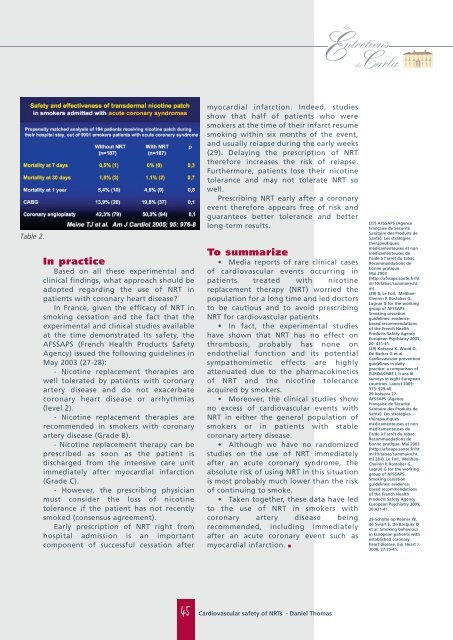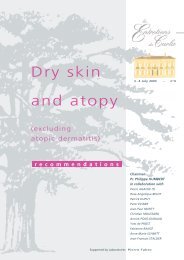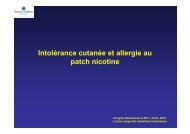Nicotine replacement therapy … - Carlos A ... - Entretiens du Carla
Nicotine replacement therapy … - Carlos A ... - Entretiens du Carla
Nicotine replacement therapy … - Carlos A ... - Entretiens du Carla
You also want an ePaper? Increase the reach of your titles
YUMPU automatically turns print PDFs into web optimized ePapers that Google loves.
Table 2.<br />
In practice<br />
Based on all these experimental and<br />
clinical findings, what approach should be<br />
adopted regarding the use of NRT in<br />
patients with coronary heart disease?<br />
In France, given the efficacy of NRT in<br />
smoking cessation and the fact that the<br />
experimental and clinical studies available<br />
at the time demonstrated its safety, the<br />
AFSSAPS (French Health Pro<strong>du</strong>cts Safety<br />
Agency) issued the following guidelines in<br />
May 2003 (27-28):<br />
- <strong>Nicotine</strong> <strong>replacement</strong> therapies are<br />
well tolerated by patients with coronary<br />
artery disease and do not exacerbate<br />
coronary heart disease or arrhythmias<br />
(level 2).<br />
- <strong>Nicotine</strong> <strong>replacement</strong> therapies are<br />
recommended in smokers with coronary<br />
artery disease (Grade B).<br />
- <strong>Nicotine</strong> <strong>replacement</strong> <strong>therapy</strong> can be<br />
prescribed as soon as the patient is<br />
discharged from the intensive care unit<br />
immediately after myocardial infarction<br />
(Grade C).<br />
- However, the prescribing physician<br />
must consider the loss of nicotine<br />
tolerance if the patient has not recently<br />
smoked (consensus agreement).<br />
Early prescription of NRT right from<br />
hospital admission is an important<br />
component of successful cessation after<br />
myocardial infarction. Indeed, studies<br />
show that half of patients who were<br />
smokers at the time of their infarct resume<br />
smoking within six months of the event,<br />
and usually relapse <strong>du</strong>ring the early weeks<br />
(29). Delaying the prescription of NRT<br />
therefore increases the risk of relapse.<br />
Furthermore, patients lose their nicotine<br />
tolerance and may not tolerate NRT so<br />
well.<br />
Prescribing NRT early after a coronary<br />
event therefore appears free of risk and<br />
guarantees better tolerance and better<br />
long-term results.<br />
To summarize<br />
• Media reports of rare clinical cases<br />
of cardiovascular events occurring in<br />
patients treated with nicotine<br />
<strong>replacement</strong> <strong>therapy</strong> (NRT) worried the<br />
population for a long time and led doctors<br />
to be cautious and to avoid prescribing<br />
NRT for cardiovascular patients.<br />
• In fact, the experimental studies<br />
have shown that NRT has no effect on<br />
thrombosis, probably has none on<br />
endothelial function and its potential<br />
sympathomimetic effects are highly<br />
attenuated <strong>du</strong>e to the pharmacokinetics<br />
of NRT and the nicotine tolerance<br />
acquired by smokers.<br />
• Moreover, the clinical studies show<br />
no excess of cardiovascular events with<br />
NRT in either the general population of<br />
smokers or in patients with stable<br />
coronary artery disease.<br />
• Although we have no randomized<br />
studies on the use of NRT immediately<br />
after an acute coronary syndrome, the<br />
absolute risk of using NRT in this situation<br />
is most probably much lower than the risk<br />
of continuing to smoke.<br />
• Taken together, these data have led<br />
to the use of NRT in smokers with<br />
coronary artery disease being<br />
recommended, including immediately<br />
after an acute coronary event such as<br />
myocardial infarction. ■<br />
45 Cardiovascular safety of NRTs - Daniel Thomas<br />
(27) AFSSAPS (Agence<br />
Française de Sécurité<br />
Sanitaire des Pro<strong>du</strong>its de<br />
Santé). Les stratégies<br />
thérapeutiques<br />
médicamenteuses et non<br />
médicamenteuses de<br />
l’aide à l’arrêt <strong>du</strong> tabac.<br />
Recommandations de<br />
bonne pratique.<br />
Mai 2003<br />
(http://afssaps.sante.fr/ht<br />
m/10/tabac/sommaire.ht<br />
m)<br />
(28) B. Le Foll, Melihan-<br />
Cheinin P, Rostoker G,<br />
Lagrue G for the working<br />
group of AFSSAPS.<br />
Smoking cessation<br />
guidelines: evidencebased<br />
recommendations<br />
of the French Health<br />
Pro<strong>du</strong>cts Safety Agency<br />
European Psychiatry 2005;<br />
20: 431-41.<br />
(29) Kotseva K. Wood D,<br />
De Backer G et al.<br />
Cardiovascular prevention<br />
guidelines in daily<br />
practice: a comparison of<br />
EUROASPIRE I, II ans III<br />
surveys in eight European<br />
countries. Lancet 2009;<br />
373: 929-40<br />
29-kotseva 27-<br />
AFSSAPS (Agence<br />
Française de Sécurité<br />
Sanitaire des Pro<strong>du</strong>its de<br />
Santé). Les stratégies<br />
thérapeutiques<br />
médicamenteuses et non<br />
médicamenteuses de<br />
l’aide à l’arrêt <strong>du</strong> tabac.<br />
Recommandations de<br />
bonne pratique. Mai 2003<br />
(http://afssaps.sante.fr/ht<br />
m/10/tabac/sommaire.ht<br />
m) 28-B. Le Foll, Melihan-<br />
Cheinin P, Rostoker G,<br />
Lagrue G for the working<br />
group of AFSSAPS.<br />
Smoking cessation<br />
guidelines: evidencebased<br />
recommendations<br />
of the French Health<br />
Pro<strong>du</strong>cts Safety Agency<br />
European Psychiatry 2005;<br />
20:431-41.<br />
29-Scholte op Reimer W,<br />
de Swart E, De Bacquer D<br />
et al. Smoking behaviour<br />
in European patients with<br />
established coronary<br />
heart disease. Eur Heart J.<br />
2006; 27:35-41.






